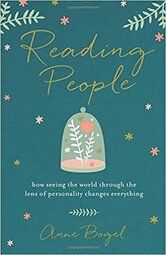My youth ministry did the 30 Hour Famine last week. It went well. Very well, in fact. Unfortunately, I felt like my colleagues didn't notice it, let alone affirm my role in it. This was disheartening to me – a fact that I hate.
Yet, what I’m beginning to understand is that this is part of my personality. My love language is words of affirmation. In order to function, I need to be noticed, appreciated, and affirmed. It’s not something I can change; It’s simply how I’m wired.
I realized this as I was reading Anne Bogel’s awesome, Reading People: How Seeing the World Through the Lens of Personality Changes Everything.

In addition to the five love languages, Reading People explores several other major personality frameworks including Keirsey’s Temperaments, The Myers-Briggs Type Indicator, The MBTI Cognitive Functions, The Clifton StrengthsFinder, and The Enneagram.
For years, I’ve been surrounded by people who frequently reference themselves according to these personality frameworks and then expect me to do the same. “I bet you’re an INTP” they’ll say, or “Are you a 3 on the Enneagram?” to which I’ll stare blankly at them.
After devouring Reading People, I can now converse with these people in their native language. I can confidently say I’m an introvert (let’s be honest, I knew that one). I’m also a rational, an INTJ whose good at input, intellection, and a learner. I’m still working on typing myself on the Enneagram but I’ve narrowed it down to a 1, 3, or 6 (If you know me, feel free to weigh in!)
Beyond being able to converse with people in their native languages about personality, Reading People helped me understand myself better. According to Anne, that's actually the point of personality frameworks. That newfound knowledge, in turn, will help me “step out of the box I’m trapped in. When I understand myself, I can get out of my own way.” Beyond that, according to Anne, “when you understand yourself better – your strengths and weaknesses, emotional needs, and driving motivations – it is much easier to understand others as well, especially when they aren’t like you.”
Which brings me back to my opening example.
A week ago, I would have gone home discouraged (and more than a little resentful) that my colleagues didn't notice my hard work and affirm my great event. But as a result of having read Reading People, I recognized that this is part of how I’m wired. Rather than stew over it, I actually shared my frustration with one of my colleagues. This led to a great conversation with him about how to better support one another in ministry – especially since we now know we don’t naturally speak each other’s love language.
That’s the power of personality frameworks – they help you to discover your best self and in the process, equip and empower you to better work with others. For that reason, I highly recommend Reading People. It’s highly engaging and super accessible - which makes it the perfect starter for people who are curious about personality frameworks but don't have the time or inclination to read a ton about any of them.
*********************************************
Disclosure: I received a free copy of Reading People from Baker Books in exchange for a fair and honest review.